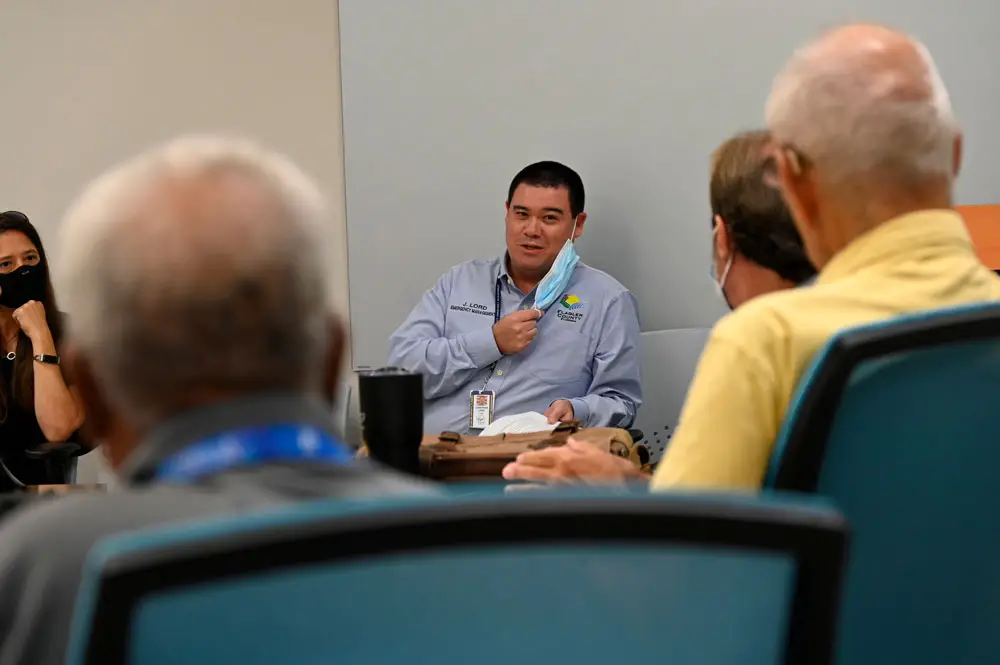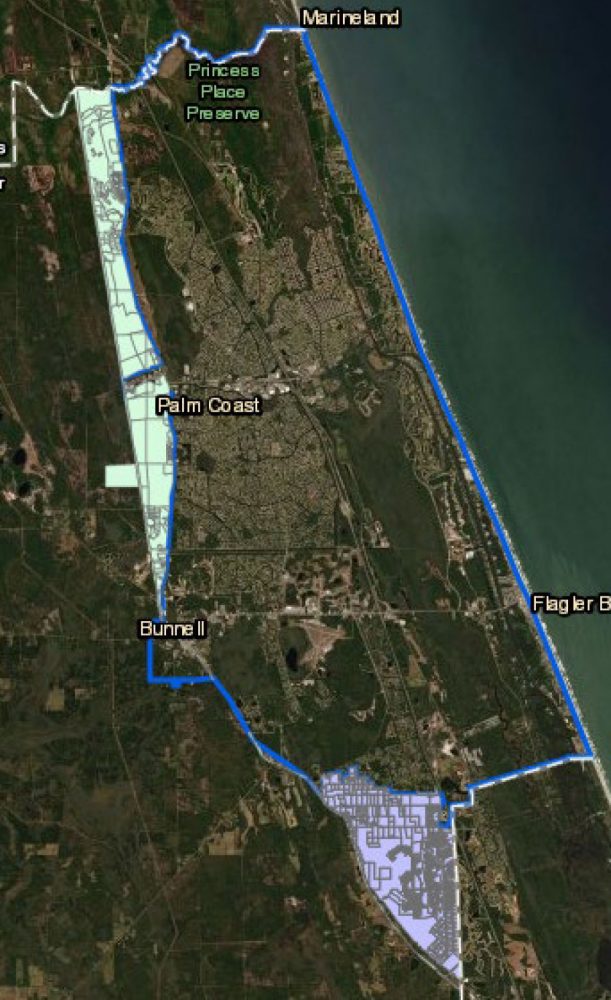
The East Flagler Mosquito Control District voted this morning to expand its spraying boundaries slightly west and south to include an area of U.S. 1 and all of Plantation Bay.
But the district abandoned further plans to phase-in spraying of the entire county. Instead, the district will work with county government to revise a 2003 agreement that enables as-needed spraying in West Flagler, at limited cost. Tweaking that agreement would ensure that there’s no risk of either overburdening the district with a much heavier workload or requiring Palm Coast, Flagler Beach and Bunnell residents, who are already taxed for spraying, to see higher bills required to subsidize spraying in West Flagler. The tax base in West Flagler is too small to account for all the added money and resources the district would need if it were to spray county-wide.
The three-member district board took a pair of unanimous votes to that effect this morning after discussions with Jonathan Lord, the county’s emergency management chief and newly appointed point person on mosquito issues from the county’s end. Lord, one of the county’s more pragmatic and to-the-point directors, was at today’s meeting, and it was his recommendations that led the board to abandon its previous plans of phasing in county-wide spraying.
The mosquito district and county government are two independent taxing authorities–and therefore, two independent government authorities, each with their own elected board, though some function of the district ultimately must be ratified by county government. County government since May had been pressuring the district to do more spraying at the western end of the county. But the county was doing so based on anecdotal evidence that the spraying was needed. Jerry Cameron, the county administrator at the time, was claiming that West-Flagler residents were complaining of not enough spraying. He invited a St. Johns County mosquito district to pitch a proposal to the county, intimating that the St. Johns operation could soon be spraying Flagler and compelling the East Flagler district to react. Cameron has since retired.
“The problem I have with this whole expansion program is, we don’t have any data, there is no data in the county” that would indicate where the complaints are coming from and to what extent, Michael Martin, one of the board members, said. “Jerry Cameron told me they have no records of where the requests for service are coming from. So we have no idea what the rest of the county’s mosquito situation is. Do we need six, eight new trucks? I don’t know. Nobody else does either. So how do we budget for that kind of expansion based on not having the data in the agricultural areas that may need?”
Currently, 94 percent of the county’s property tax base is in the 20 percent of the county that’s getting sprayed. If the district were to cover the whole county, the very sparsely populated west would have the remaining 6 percent of the tax base underwrite an 80 percent geographic expansion. “Do we have to raise our millage rate significantly to try to help fund that? These are discussions that at this point can’t be answered because we don’t know what the new expenses are going to be.”
The county and East Flagler Mosquito District have had an agreement in place since 2003 that accounts for some spraying on the west side, on an as-needed basis. Residents outside the district who want spraying have to call the county. The county then has to contact the district and request the as-needed spraying. The district fulfills that request and bills the county. That system worked until around 2016, when the district stopped getting requests from the county.
Either the 2003 agreement was no longer working, or there was simply a communication breakdown. Lord said it was more a matter of reestablishing clear communications and having someone at the county’s end designated as the person responsible for fielding county residents’ requests. There was no such designee before. There is one now: Lord.
“I think the 2003 agreement can work moving forward,” Lord said. But he said it is “very confusing” for a resident to call one office then have to call another and never get a resolution. “They don’t care what it says outside your pickup truck. They just know they have an issue, they want to file a complaint, at the end of the day they want someone to solve that issue, or at least be told sorry, we can’t solve that issue for you, as opposed to maybe we’ll get back to you.” As the point person, Lord said he would receive the requests and log them in a computerized mapping system that would then automatically forward the requests to the district.
Lord confirmed that county staff went through “all of our records, we’ve gone through archives of email records, people’s memories or phone calls,” and saw few mosquito-related complaints. On the County Commission, however, Commissioner Joe Mullins, whose district covers the west side, would often speak of residents’ complaints as if it were an ongoing problem. “So I had a talk with him about that. He has not had a ton of complaints,” Lord said. “But we had a very good discussion about the size and the scope of the demand in the first place. I don’t think that the demand is big.” At least in proportion to the geography: Had there been a higher volume of documented requests, he said, the county would had had spiking requests in particular areas such as Espanola and Daytona North. Those requests have not been coming in. (He subsequently said all requests would be treated seriously.)
“So, to sum up, I think we can make 2003 work. I don’t think it’s rocket science.” Rather, it’s a matter of communications.
The mosquito board liked that approach–and liked even better the retreat from having to consider expansion across the county, an expansion rife with its own issues in an area dominated by growers who don’t want their fields sprayed.
“If there’s really not that much demand in the rest of the county for mosquito control, then it seems to me a reactive service would be the most efficient way to do it,” Martin said of the as-needed approach. “I don’t know whether we could afford to do the full proactive surveys that we do in the district in the entire county.”
“Unless you subsidized with the existing district taxpayers,” Lord said.
So the mosquito board decided to scrap the broader approach and direct its executive director, Mark Positano, to meet with Lord and work out a more effective as-needed system.
The expansion of the district’s boundaries, to include the new residential development of Sawmill Creek and other areas in a thin north-south line along U.S. 1 and take over spraying in Plantation Bay (where Volusia has been spraying), is based on a document the district will send to the County Commission for approval in what will largely be a formality. But once that’s done, then the two communities’ tax bases will be added to the district’s revenue stream. Especially in Plantation Bay, that tax base is not minor. The district held a public hearing on Aug. 4 about the expansion. Only 10 people showed up. The district had sent out a glossy mailer to potentially affected residents showing the new boundaries of the expansion, and noting the meeting, but with little additional detail. “I don’t think those people care whether we spray or not,” Julius Kwiatkowski, who chairs the board, said of the turnout.
In a distantly related part of the conversation, Positano and the board discussed the future possibility of using drones to spray, thus providing an in-between approach between the targeted truck approach, witnessed in dense city streets, as opposed to the aerial spraying approach conducted with the district’s helicopter, an approach that targets 6,000 acres at a time and makes it difficult, if not impossible, for particular properties within that 6,000-acre block to be excluded, even if property owners request to be on a no-spray list.
![]()






























Perry Mitrano says
The Mosquito District and EOC getting together is a brilliant idea.
I congratulate them for showing us a fine example on what excellent responsible municipal management should look like.
Managing, cost with responsible expansion.
What a novel idea for government.
Mike Martin says
The Board of Commissioners did NOT vote to approve the expansion plan. We voted to start the legal paperwork process to prepare for the expansion process. I made a statement before we took the vote to clarify what the vote actually meant. We Commissioners will still have to vote to formally approve the expansion plan at a future meeting and then send a request to the County Commission to amend our Charter. The County Commission will then have to vote to approve the expansion.